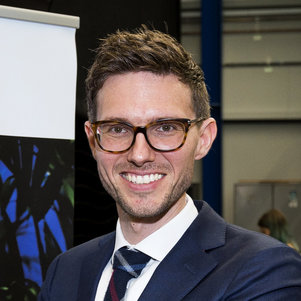Keynotes
Guido de Croon
Autonomous flight of tiny drones.
September, 5th
Tiny drones are promising for many applications, such as search-and-rescue, greenhouse monitoring, or keeping track of stock in warehouses. Since they are small, they can fly in narrow areas. Moreover, their light weight makes them very safe for flight around humans. However, making such tiny drones fly completely by themselves is an enormous challenge. Most approaches to Artificial Intelligence for robotics have been designed with self-driving cars or other large robots in mind – and these are able to carry many sensors and ample processing. In my talk, I will argue that a different approach is necessary for achieving autonomous flight with tiny drones. In particular, I will discuss how we can draw inspiration from flying insects, and endow our drones with similar intelligence. Examples include the fully autonomous “DelFly Explorer”, a 20-gram flapping wing drone, and swarms of CrazyFlie quadrotors of 30 grams able to explore unknown environments and find gas leaks. Moreover, I will discuss the promises of novel neuromorphic sensing and processing technologies, illustrating this with recent experiments from our lab. Finally, I will discuss how insect-inspired robotics can allow us to gain new insights into nature. I illustrate this with a recent study, in which we proposed a new theory on how flying insects determine the gravity direction.

Short bio: Guido de Croon received his M.Sc. and Ph.D. in the field of Artificial Intelligence (AI) at Maastricht University, the Netherlands. His research interest lies with computationally efficient, bio-inspired algorithms for robot autonomy, with an emphasis on computer vision. Since 2008 he has worked on algorithms for achieving autonomous flight with small and light-weight flying robots, such as the DelFly flapping wing MAV. In 2011-2012, he was a research fellow in the Advanced Concepts Team of the European Space Agency, where he studied topics such as optical flow based control algorithms for extraterrestrial landing scenarios. After his return at TU Delft, his work has included fully autonomous flight of a 20-gram DelFly, a new theory on active distance perception with optical flow, a swarm of tiny drones able to explore unknown environments, and neuromorphic sensing and processing. Currently, he is Full Professor at TU Delft and scientific lead of the Micro Air Vehicle lab (MAVLab) of Delft University of Technology.
Andrew Davison
A Robot Web for Many-Device Localisation and Planning
September, 6th
Safe and useful robots for complex environments must use their on-board sensors and computation to map, understand and localise within their surroundings, and we can envision a future where many such devices, with different functions and made by different companies, should operate in the same space. Is there a more modular way for this to work than all devices needing to use the same unified cloud-based “maps” system?
I will present and demonstrate our Robot Web proposal for distributed solutions to many robot localisation and planning based on per-device local computation and storage, and peer-to-peer communication between heterogenous devices via standardised open protocols. Our method uses Gaussian Belief Propagation-based distributed inference on full non-linear factor graph, and is highly robust and scalable while remaining simple and modular.

Short bio: Andrew Davison is Professor of Robot Vision and Director of the Dyson Robotics Laboratory at Imperial College London. His long-term research focus is on SLAM (Simultaneous Localisation and Mapping) and its evolution towards general `Spatial AI’:computer vision algorithms which enable robots and other artificial devices to map, localize within and ultimately understand and interact with the 3D spaces around them. With his research group and collaborators he has consistently developed and demonstrated breakthrough systems, including MonoSLAM, KinectFusion, SLAM++ and CodeSLAM, and recent prizes include Best Paper at ECCV 2016, Best Paper Honourable Mention at CVPR 2018 and the Helmholtz Prize at ICCV 2021. He has also had strong involvement in taking this technology into real applications, in particular through his work with Dyson on the design of the visual mapping system inside the Dyson 360 Eye robot vacuum cleaner and as co-founder of applied SLAM start-up SLAMcore. He was elected Fellow of the Royal Academy of Engineering in 2017.
Jan Peters
Inductive Biases for Robot Reinforcement Learning
September, 7th
Autonomous robots that can assist humans in situations of daily life have been a long-standing vision of robotics, artificial intelligence, and cognitive sciences. A first step towards this goal is to create robots that can learn tasks triggered by environmental context or higher-level instruction. However, learning techniques have yet to live up to this promise as only few methods manage to scale to high-dimensional manipulator or humanoid robots. In this talk, we investigate a general framework suitable for learning motor skills in robotics which is based on the principles behind many analytical robotics approaches. To accomplish robot reinforcement learning from just few trials, the learning system can no longer explore all learn-able solutions but has to prioritize one solution over others – independent of the observed data. Such prioritization requires explicit or implicit assumptions, often called ‘induction biases’ in machine learning. Extrapolation to new robot learning tasks requires induction biases deeply rooted in general principles and domain knowledge from robotics, physics and control. Empirical evaluations on a several robot systems illustrate the effectiveness and applicability to learning control on an anthropomorphic robot arm. These robot motor skills range from toy examples (e.g., paddling a ball, ball-in-a-cup) to playing robot table tennis, juggling and manipulation of various objects.

Short bio: Jan Peters is a full professor (W3) for Intelligent Autonomous Systems at the Computer Science Department of the Technische Universitaet Darmstadt since 2011, and, at the same time, he is the dept head of the research department on Systems AI for Robot Learning (SAIROL) at the German Research Center for Artificial Intelligence (Deutsches Forschungszentrum für Künstliche Intelligenz, DFKI) since 2022. He is also a founding research faculty member of the Hessian Center for Artificial Intelligence. Jan Peters has received the Dick Volz Best 2007 US PhD Thesis Runner-Up Award, the Robotics: Science & Systems – Early Career Spotlight, the INNS Young Investigator Award, and the IEEE Robotics & Automation Society’s Early Career Award as well as numerous best paper awards. In 2015, he received an ERC Starting Grant and in 2019, he was appointed IEEE Fellow, in 2020 ELLIS fellow and in 2021 AAIA fellow. Despite being a faculty member at TU Darmstadt only since 2011, Jan Peters has already nurtured a series of outstanding young researchers into successful careers. These include new faculty members at leading universities in the USA, Japan, Germany, Finland and Holland, postdoctoral scholars at top computer science departments (including MIT, CMU, and Berkeley) and young leaders at top AI companies (including Amazon, Boston Dynamics, Google and Facebook/Meta). Jan Peters has studied Computer Science, Electrical, Mechanical and Control Engineering at TU Munich and FernUni Hagen in Germany, at the National University of Singapore (NUS) and the University of Southern California (USC). He has received four Master’s degrees in these disciplines as well as a Computer Science PhD from USC. Jan Peters has performed research in Germany at DLR, TU Munich and the Max Planck Institute for Biological Cybernetics (in addition to the institutions above), in Japan at the Advanced Telecommunication Research Center (ATR), at USC and at both NUS and Siemens Advanced Engineering in Singapore. He has led research groups on Machine Learning for Robotics at the Max Planck Institutes for Biological Cybernetics (2007-2010) and Intelligent Systems (2010-2021).
